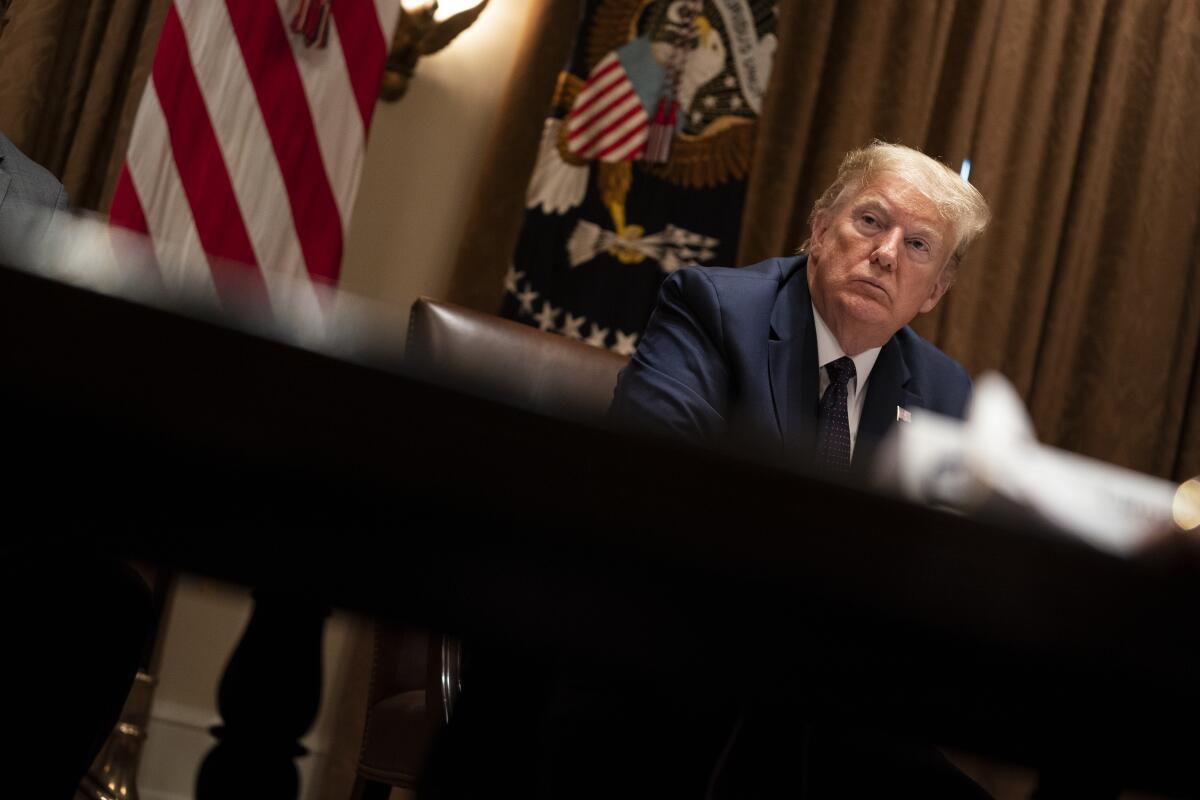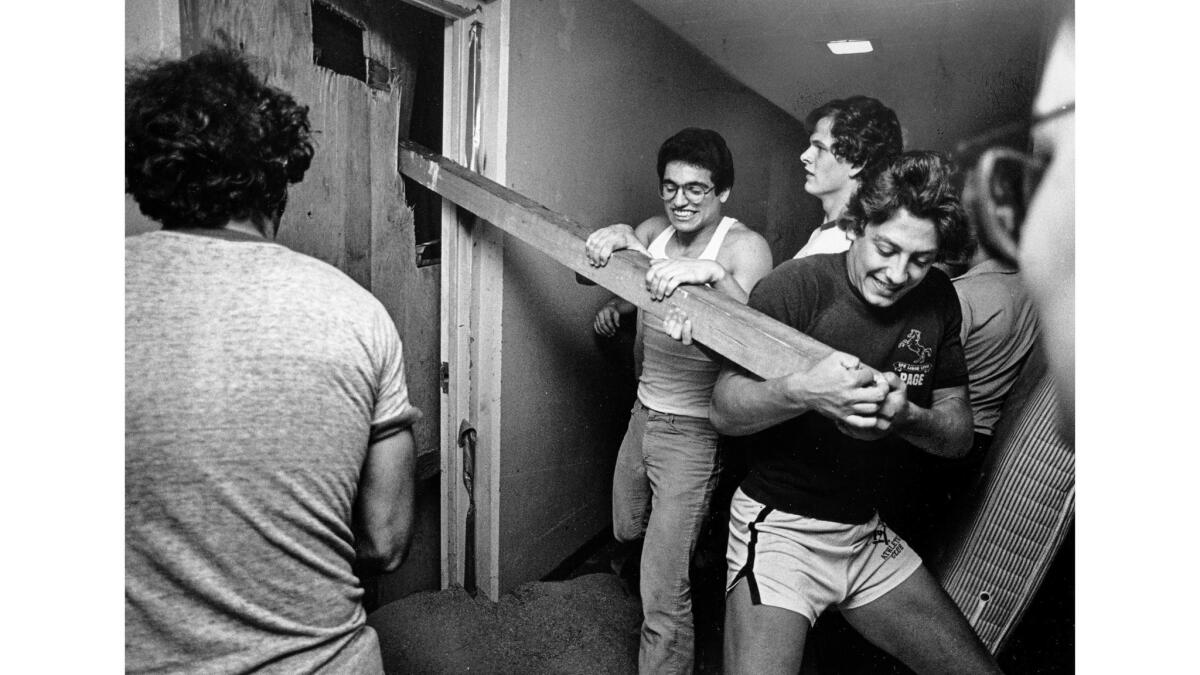Newsletter: Amid crisis, Trump distracts

- Share via
President Trump is lashing out more and more with distractions and disinformation.
TOP STORIES
Amid Crisis, Trump Distracts
As the U.S. death toll from COVID-19 has climbed above 90,000, President Trump has accelerated his attacks on government watchdogs, judges, reporters and other independent voices in his run for reelection, escalating his spread of disinformation about perceived enemies and his administration’s record during the coronavirus crisis.
Start your day right
Sign up for Essential California for the L.A. Times biggest news, features and recommendations in your inbox six days a week.
You may occasionally receive promotional content from the Los Angeles Times.
Since Friday, Trump has fired yet another inspector general, who Democrats say was investigating possible impropriety in massive arms sales to Saudi Arabia; raged against a government whistleblower; and repeatedly retweeted video of a local TV reporter being harassed in New York. He also amplified a sinister conspiracy theory he dubbed “Obamagate” in which he alleges, but never specifies, crimes by his predecessor.
On Monday, Trump — who won’t wear a mask but has touted hydroxychloroquine as a potential “game changer” — abruptly claimed he’s been taking the pills daily for “about a week and a half” as a preventative against the coronavirus. The Food and Drug Administration has warned the anti-malaria drug has not been proven to fight COVID-19 and could cause “serious heart rhythm problems.”
Experts have struggled to think of a historical parallel where a U.S. president has turned the world’s most powerful and influential office into a megaphone for wholesale fabrications and bizarre claims in an effort to confuse voters and salvage his own political future.
California’s New Rules for Reopening
For much of California, there are signs more communities may slowly reopen businesses. That’s because Gov. Gavin Newsom has loosened the rules linking coronavirus infection rates to allowed activities.
The rules will allow restaurant dining rooms and shopping malls to open again in counties that meet the new criteria. The governor also hinted that even bigger changes envisioned in later stages of reopening are just around the corner, such as the opening of hair salons and even spectator-free sporting events as soon as the first week in June. That includes Major League Baseball, which would like to start the first week of July.
Newsom said the changes mean that 53 of California’s 58 counties may choose to now move further into the second of four stages toward reopening. The decision was prompted, he said, by data suggesting steady rates of hospitalizations and COVID-19 patients treated in intensive care units, as well as increased testing and more protective gear for healthcare workers.
The situation is quite different in Los Angeles County, which continues to outpace other parts of the state in confirmed cases and deaths. Local officials say the infection rate in the county is falling, but that they remain concerned about the potential spread of the disease.
Rooms Remain Empty
Project Roomkey, Newsom’s program to get mostly homeless people off the streets to slow the spread of the coronavirus, isn’t going as smoothly.
A review of state records by The Times shows that only about half of the 15,000 hotel and motel rooms that California has leased are now occupied.
The occupied rooms account for — at most — less than 5% of the 151,000 people who sleep on street corners, under bridges and in emergency shelters across California.
More Top Coronavirus Headlines
— The former pharmaceutical executive leading the White House’s coronavirus vaccine effort is divesting from vaccine developer Moderna Inc., after early-stage test results sent the biotech company’s stock soaring. Columnist Michael Hiltzik explains why, despite the results being promising, much more testing must happen.
— Two months ago, Congress approved $500 billion in emergency funds. A congressional report shows the Treasury Department has disbursed just $37.5 billion of that money. None of the $46 billion Congress set aside specifically for the airline industry and businesses critical to maintaining national security has been allocated.
— Federal authorities are urging governors to use “extreme caution” in deciding when to allow visits to resume at nursing homes, saying such a move shouldn’t come before all residents and staff have tested negative for at least 28 days.
— At a virtual worldwide health gathering, Chinese President Xi Jinping announced a $2-billion contribution to fight the coronavirus and urged solidarity with the World Health Organization, while the U.S. renewed bitter accusations against the U.N.’s health agency and jabbed at it and China.
— To identify the most effective COVID-19 drugs at top speed, the National Institutes of Health have embraced an approach called the adaptive clinical trial.
— With campuses closed, parents around the U.S. are reporting academic, financial struggles and stress.
For more, sign up for Coronavirus Today, a special edition of The Times’ Health and Science newsletter.
FROM THE ARCHIVES
Each May, students at Caltech would participate in a long-running tradition called Ditch Day. The seniors took the day off but left a challenge for the underclassmen in the form of elaborate locks, puzzles and barriers that secured their dorm rooms.
In 1979, The Times covered Ditch Day as younger students tried to break into the rooms. “If and when a stack is broken and the underclass hordes sweep into the room, they usually find cakes, cookies, soft drinks, or a jug of wine waiting for them, a bribe to leave the interior of the room undisturbed,” according to writer George Alexander. But the freshmen, sophomores and juniors can have their revenge, too: They might trash the room or reset the barricade to challenge the returning senior.

CALIFORNIA
— Officials say three Southern California men were abducted to Tijuana and two of them were killed in cross-border kidnappings over the span of one month.
— UC President Janet Napolitano wants to suspend a standardized testing requirement. But the head of the ACT testing organization is pushing back, arguing it will fuel student uncertainty, strain budgets and exacerbate concerns about fairness by making the admissions process more subjective.
— For nearly a century, Olvera Street merchants — many of them now descendants of original vendors — have sold handcrafted items such as pottery, candles and Mexican folk art. Their survival is intertwined with tourism that has dried up in the pandemic.
— If you live in Southern California, there’s a good chance that you have at some point received medical care from a Filipino American professional, writes columnist Frank Shyong. First they had to fight discrimination to get there. Now they’re fighting for PPE.
Support our journalism
Subscribe to the Los Angeles Times.
NATION-WORLD
— U.S. officials say the gunman who killed three U.S. sailors at a military base in Florida last December communicated with Al Qaeda operatives about planning and tactics in the months leading up to the attack.
— A $42-million ransom demand for hacked files that purportedly threaten to incriminate Trump is hanging over a New York law firm representing some of the top acts in the entertainment business.
— In remote parts of the U.S., post offices are not only a utility, but pillars of their communities. The coronavirus and financial woes threaten to close them.
— In Brazil, the coronavirus is spreading to rainforest areas where tribe members live in close quarters with limited medical services.
— European hot spots like Venice, Italy, are reopening, but without many tourists.
HOLLYWOOD AND THE ARTS
— Sunday marked the eighth and final installment of John Krasinski’s goodwill YouTube project “Some Good News.” The episode spotlighted the many everyday people who have supported the show by crafting fan art and filming their own versions of Krasinski’s feel-good broadcast from around the world.
— A new Spike Lee film is coming to Netflix. On Monday, the streaming service released its first trailer for “Da 5 Bloods,” which follows a group of vets from the days of Vietnam through the Trump era.
— Ken Osmond, who played the two-faced teenage scoundrel Eddie Haskell on TV’s “Leave It to Beaver,” has died at age 76.
— How “She-Ra” rewrote the script for TV’s queer love stories.
BUSINESS
— In an unexpected move, more than 20 Los Angeles restaurants, including Canter’s, Sichuan Impression and Sweetfin, have signed a petition opposing an L.A. City Council proposal to cap third-party delivery app fees.
— Kevin Mayer, the chairman of Walt Disney Co.’s streaming business, is leaving the company to run the fast-growing mobile video app TikTok.
SPORTS
— From Little League to the highest levels of sport, the handshake is a universally recognized symbol of sportsmanship. What happens when the coronavirus attaches risk to the briefest touch?
— The NFL intends to make changes to the Rooney Rule to further encourage diversity in hiring, with one proposal using draft positioning as an incentive to teams.
Free online games
Get our free daily crossword puzzle, sudoku, word search and arcade games in our new game center at latimes.com/games.
OPINION
— Georgia’s coronavirus data have made reopening look safe. The numbers were a lie and nothing about the spread or the nature of the coronavirus suggests that it’s safe to get back to business as usual, writes Matthew Fleischer.
— Banana bread is favorite of quarantine bakers. It’s also deeply overrated, writes The Counter editor Karen Stabiner.
WHAT OUR EDITORS ARE READING
— The National Spelling Bee was canceled because of the coronavirus. If the organizers don’t change course, the eighth-graders who spent hundreds of hours in training will be out of luck. (The Guardian)
— A missing wife. A ransom note. Cryptocurrency. A jazz-loving police detective. Two hotshot reporters. In Norway, crime is mostly made-for-TV, but a rare, real case is stranger than fiction and it’s become a national obsession. (New York Times)
ONLY IN CALIFORNIA
Months into California’s strict coronavirus restrictions, plenty of people are finding that quarantine stress has them feeling a little rebellious. The Times asked readers to anonymously share their less-than-proud, can’t-take-it-anymore moments — a reminder that you’re not alone if you’re feeling weird. There are secret haircuts and manicures. There are orders of sequin dresses and bath bombs. A few readers have participated in illicit social gatherings. And one says they’re retaliating against their roommates’ gatherings with raccoons. Read more here.
Comments or ideas? Email us at headlines@latimes.com.
Sign up for Essential California
The most important California stories and recommendations in your inbox every morning.
You may occasionally receive promotional content from the Los Angeles Times.






